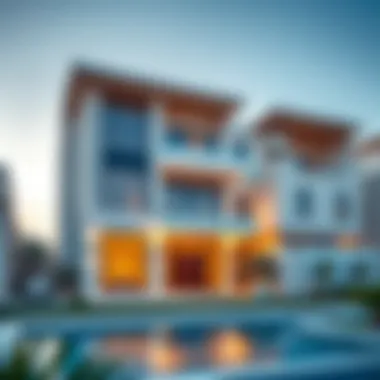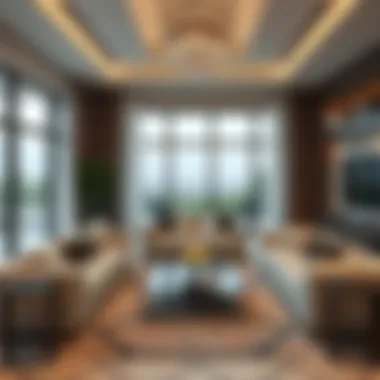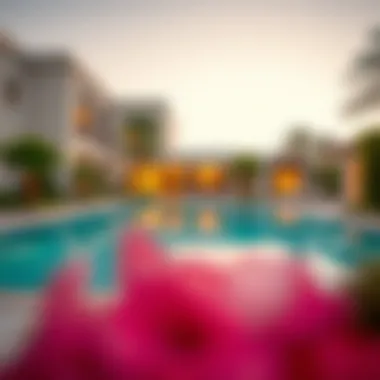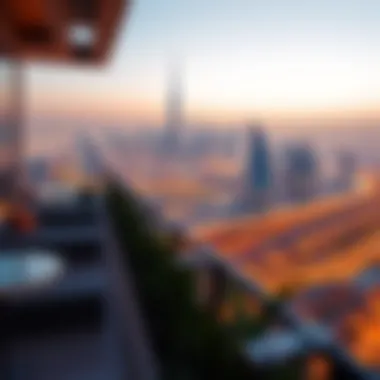Exploring Villa Elegance in Dubai's Real Estate Market


Intro
Dubai stands as a shimmering beacon of luxury and innovation, with its real estate market often considered a microcosm of the broader global trends. One of the most sought-after elements within this domain is villa elegance, a term that encapsulates not just architectural beauty but also lifestyle and investment viability. With its unique blend of ultra-modern facilities and subtler traditional elements, the villas here speak volumes about the aspirations of those who call this dazzling city home.
In our exploration of villa elegance in Dubai's competitive real estate landscape, we’ll break down key aspects that paint a complete picture for investors, analysts, and discerning homeowners. From current market trends and investment opportunities to the lifestyle implications of these luxurious properties, we aim to deliver a comprehensive view. This guide is designed for those who appreciate the nuances of the high-end market and seek to navigate it effectively.
In this section, we will provide insights into the latest market trends, outlining the current state of the Dubai real estate market. We will also discuss price trends that reflect the ongoing evolution of villa development in this dynamic city.
Preamble to Villa Elegance
In the realm of Dubai's real estate market, villa elegance emerges as a touchstone of luxury living. The significance of this concept goes beyond mere aesthetics; it encapsulates an amalgamation of superior design, architectural innovation, and an enriched lifestyle. Villas crafted with an emphasis on elegance not only capture the eye but also create an inviting atmosphere that speaks to the affluent lifestyle many aspire to.
Defining Elegance in Villas
Elegance within the context of villas can be seen as a harmonious balance of form and function. It involves the meticulous selection of materials, use of space, and attention to detail that resonate with sophisticated taste. Whether it's the graceful arches of Mediterranean designs or the sleek lines of contemporary structures, elegance is about creating a feeling—one that exudes comfort and opulence.
For instance, imagine stepping into a villa where expansive glass walls invite the golden rays of the Dubai sun, beautifully reflecting off polished marble surfaces. Such details define the essence of elegance, showcasing thoughtfully designed interiors that appeal to both aesthetic preference and practical living.
The Role of Elegance in Real Estate
In a market as dynamic as Dubai's, the role of elegance in real estate cannot be overstated. High-end properties oftentimes inhabit a different category altogether, where elegance serves as a critical differentiator. Buyers are not just looking for a place to live; they are investing in a lifestyle. When villas offer elegant features—from state-of-the-art appliances to impeccably landscaped gardens—they communicate a promise of quality and exclusivity.
Consider two neighboring villas: one offers a stark, utilitarian approach, while the other is adorned with carefully curated art pieces and bespoke finishes. The latter instantaneously becomes a coveted property, highlighting how elegance significantly influences real estate value.
"Elegance isn't just a style; it's a reflection of the life one chooses to lead. In Dubai's real estate landscape, this is magnified manifold."
The impact of elegance extends further, shaping buyer preferences, inviting high net-worth individuals to join a community of like-minded peers, and ultimately establishing a benchmark for luxury living. Whether you are an investor, homeowner, or real estate agent, understanding the intricacies of villa elegance equips you with the insights necessary to navigate this vibrant market with finesse.
Architectural Styles of Villas in Dubai
The architectural styles of villas in Dubai offer a vibrant narrative that reflects both the cultural heritage and modern aspirations of the city. Dubai is known for its extravagant lifestyle and luxury real estate, where the design of villas is as crucial as their location and amenities. Each style tells a story, attracting diverse groups of homeowners and investors who recognize the intrinsic value behind unique architectural aesthetics. Understanding these styles isn't just about home design; it’s about comprehending buyers' emotional connections to their living spaces and the potential return on investment tied to them.
Contemporary Designs
Contemporary designs are all the rage in Dubai's villa market. Sleek lines, open spaces, and cutting-edge materials combine to create homes that are not just living spaces but also works of art. Large glass walls, modern finishes, and asymmetrical designs stand as hallmarks of this category. Homeowners are often drawn to contemporary villas because they reflect a lifestyle that values both luxury and practicality.
- Open Layouts: These homes often feature expansive open layouts that invite natural light, effectively merging indoor and outdoor environments.
- Sustainability: Many contemporary designs include sustainable practices, integrating solar panels and energy-efficient appliances, appealing to environmentally conscious buyers.
- Customization: Designers often allow for bespoke features, reflecting individual tastes and desires, making these properties highly personalized.
Prospective buyers seeking to invest in contemporary villas will find properties ripe with appeal, particularly among younger families and global expatriates who prioritize modernity.
Traditional Arabian Influences
Embodying the spirit of the region, villas with traditional Arabian influences encapsulate cultural essence. These designs often incorporate intricate geometrical patterns, archways, and courtyard gardens that breathe life into the structures. Homes styled in this manner provide a unique opportunity to experience the rich heritage of Dubai while enjoying modern luxuries.
- Moorish Architecture: Elements such as mashrabiya screens and ornamental tiles showcase the intricate artistry that defines many Arabian structures.
- Spacious Courtyards: The design often includes large courtyards that promote social gatherings, providing an area for outdoor relaxation while maintaining a level of privacy.
- Natural Materials: Wood and stone are commonly used to create a warm and inviting atmosphere, making residents feel connected to the locale.
Investors typically value these villas not only for their aesthetics but also for their ability to resonate with the local populace, enhancing their desirability in the market.
Mediterranean Inspirations
Villas inspired by Mediterranean styles capture the enchanting allure of places like Spain, Italy, and Greece. These homes often feature stucco walls, tiled roofs, and spacious terraces that take full advantage of Dubai’s sunny climate. The design promotes a laid-back lifestyle, perfect for those wanting to unwind after a long day.
- Warm Color Palettes: Earthy tones and pastel shades create a harmonious atmosphere, blending beautifully with lush landscaping.
- Outdoor Living Spaces: Many Mediterranean villas boast outdoor kitchens and infinity pools, encouraging a lifestyle centered around entertaining guests.
- Rustic Charm: The use of weathered wood beams and Mediterranean tiles adds a rustic charm, making these villas cozy yet elegant.
For investors, Mediterranean villas present substantial opportunities as they cater to retirees, foreigners, and anyone looking for a vacation home that embodies relaxation and beauty.
One must remember that the architectural style of a villa plays a vital role in determining its marketability and value. As trends shift towards more sustainable and environmentally friendly designs, understanding the various styles available can help investors and homeowners alike make enlightened decisions in Dubai's dynamic villa market.
Market Trends in Villa Real Estate
Understanding the market trends in villa real estate is a crucial aspect for anyone navigating Dubai's upscale housing landscape. The villa market doesn't merely reflect a collection of properties; rather, it serves as a barometer for the overall economic conditions and cultural sentiments driving luxury living. This segment continually evolves, influenced by changing demographics, local governance, and shifting preferences.
Current Pricing Dynamics
Pricing dynamics in Dubai's luxury segment can be a tangled web to untangle. Recently, villa prices have exhibited an upward trajectory due to several factors, including increased demand from expatriates and affluent locals seeking larger living spaces. The allure of space coupled with privacy is increasingly attractive in the post-pandemic world.
- Supply and Demand: Market demand has seen an uptick, resulting in a shortage of available high-end villas. This imbalance naturally pushes prices higher.
- Location, Location, Location: Prestigious areas like Palm Jumeirah and Arabian Ranches often command premium prices. The value of a villa can vary drastically based on its location, proximity to amenities, and proximity to the economic centers of Dubai.
- Market Insights: Reports reveal that the affluent sector is not deterred by increasing prices, often viewing such investments as more stable in volatile markets. Homebuyers are prepared to pay a premium for properties with standout features, enhancing the overall value of investments.
"As we see more buyers leveraging their investments with strategic insights, the villa market will continue to thrive, reflecting a blend of local culture and global influences.”
Buyer Preferences
When it comes to discerning buyers, preferences can often paint a vivid picture of prevailing market sentiments. In recent years, buyers are increasingly favoring villas that offer a synergy of luxury and functionality. Here’s what attracts many buyers today:
- Eco-friendly Features: Many are on the lookout for energy-efficient designs, solar panels, and sustainable materials, reflected in the growing eco-conscious market.
- Smart Home Technologies: Integrating advanced technologies for security, climate control, and entertainment often sweetens the deal.
- Customization: Buyers are keen on bespoke designs tailored to personal tastes—boutique developments offering customization can quickly gain traction.
- Amenities: Features such as private pools, gardens, and access to community facilities like clubs or gyms directly increase their desirability.
Investment Growth Opportunities
Investment in Dubai’s villa market holds substantial potential, particularly for long-term growth. Investors should keep an eye on:


- Emerging Neighborhoods: Areas such as Dubai Hills Estate and Jumeirah Golf Estates are seeing significant development, offering opportunities at comparatively lower entry points with fantastic growth potential.
- Short-term Rentals: Given the tourist influx in the region, villas in prime locations are ripe for short-term rental platforms like Airbnb, providing excellent yields.
- Government Incentives: The UAE government has been proactive in stimulating foreign investment through various initiatives, making it more attractive for investors to park their money in real estate.
- Economic Stability: The continuous development of infrastructure and business hubs positions Dubai as a steadfast choice for investors, ensuring long-term growth is attainable.
In summary, staying informed about market trends is vital for stakeholders in the villa real estate market in Dubai. By paying attention to current pricing dynamics, evolving buyer preferences, and potential investment opportunities, one can make educated decisions that align with future market directions.
For more detailed insights into Dubai’s real estate market trends, you may refer to resources like Dubai Land Department or consult market analysis on Property Finder.
The Lifestyle Aspect of Villa Living
Living in a villa in Dubai is not just a matter of owning a property; it’s about embracing a lifestyle that exudes elegance and sophistication. The allure of villa living is significantly influenced by various factors that contribute to a high quality of life. This section delves into the essential aspects of lifestyle associated with villa ownership, emphasizing amenities, community engagement, and the all-important location benefits that make villa living a coveted choice.
Amenities and Features
When it comes to villa living, amenities can make all the difference. Modern villas in Dubai often come equipped with a plethora of features designed to enhance comfort and luxury. Think of private swimming pools, state-of-the-art kitchens, landscaped gardens, and expansive terraces that offer breathtaking views. These amenities not only provide convenience but are also perfect for entertaining guests. A villa with a home cinema, for instance, allows for private film screenings, creating a luxurious experience right at home.
In addition to physical attributes, many villas also offer smart home technologies which enhance security and efficiency. Home automation allows homeowners to control lighting, climate, and even security systems remotely. This blend of technology with luxury is particularly appealing to a tech-savvy demographic looking for modern living solutions.
Furthermore, it’s worth mentioning that recreational facilities such as gyms, spas, and even private beaches are often part of the villa community’s offerings. Thus, when investors consider the lifestyle aspect, they are not just investing in a residence; they are buying into an entire lifestyle tailored to pamper and engage.
Community and Social Environment
Villas aren’t just secluded havens; they are often embedded in vibrant communities. One significant aspect of villa living in Dubai is the community environment. Many residential developments are designed to foster social interaction. Gated communities often feature parks, walking trails, and communal spaces, encouraging residents to mingle and engage.
This connects back to the cultural narrative in Dubai, where community is vital. Having neighbors who share similar lifestyles and values can enrich one’s living experience. Housing in these communities promotes comfort, safety, and a sense of belonging.
In essence, villa living offers a chance to build lasting relationships with like-minded individuals. Social events and community gatherings not only fortify this social fabric but also foster a rich living experience full of opportunities.
Accessibility and Location Benefits
The location of villas in Dubai is often a strategic choice for both convenience and lifestyle enhancement. Many of these luxury properties are situated in prime locations that provide easy access to key areas of the city including business districts, shopping malls, and cultural landmarks.
Living near major thoroughfares and transportation hubs, such as the Dubai Metro, reduces the time spent commuting, enabling residents to spend more quality time enjoying their lavish surroundings. This is particularly important for busy professionals or families who value convenience in their daily lives.
Moreover, accessibility to essential services such as international schools, healthcare facilities, and supermarkets enhances the attractiveness of villa living. Families looking for a balance between luxury and practicality find these lifestyle benefits particularly appealing. In short, the strategic location of these villas amplifies their overall value, making them an attractive investment for discerning buyers.
"In Dubai, owning a villa is more than a financial investment; it’s a gateway to a lifestyle steeped in elegance and convenience."
In summary, the lifestyle aspect of villa living encapsulates more than just opulent features. It represents a unique confluence of community, accessible location, and luxurious amenities, attracting individuals who seek more than just a dwelling. As the demand for villas continues to grow, understanding these lifestyle benefits becomes essential for anyone looking to navigate the vibrant Dubai real estate market.
Investment Strategies for Villa Buyers
In the complex landscape of Dubai’s real estate, navigating the villa segment requires a sharp eye and robust investment strategies. Each decision can be the difference between merely owning property and securing a valuable asset that appreciates over time. For discerning buyers, understanding the nuances of investment is crucial. Success isn’t just about the initial purchase; it involves a comprehensive approach from evaluating property values to considering the risks that come along with ownership.
Evaluating Property Value
To start, evaluating property value in Dubai'sVilla market involves more than just a cursory glance at the price tag. It’s about getting the full picture of what you’re buying. Factors include location, architectural design, and the surrounding amenities. A villa near the Dubai Marina, for instance, might fetch a higher price compared to one in a less popular area.
Additionally, it pays to look into previous sales for similar properties. Online platforms often list comparable sales which can provide a benchmark for your comparisons. Always consider factors like the age of the property and recent renovations. Buyers might also want to consult a property appraisal professional to gain further insight into the market dynamics and property analytics.
- Current Market Trends: Keep an eye on how the market is performing overall. Trends can affect both short and long-term value.
- Property Condition: Inspect the villa thoroughly. Issues with plumbing or electrical systems can significantly reduce property value.
- Future Development Plans: Check if there are upcoming developments in the area. New infrastructure can enhance property values.
Long-term vs Short-term Investments
The next significant consideration for villa buyers is deciding between long-term and short-term investments. This choice often reflects personal goals and market conditions, weaving a keen understanding of each strategy’s potential returns.
Short-term investment may suit those looking to flip properties. Buyers can benefit from a quick sale if they manage to incorporate modern improvements or capitalize on a rising market. For instance, purchasing a villa, conducting some updates, and reselling it shortly thereafter can yield substantial profits.
On the other hand, long-term investments are generally regarded as safer bets. Owning property for years often leads to appreciation in property value, yielding a better return in the long run. Plus, with properties rented out, there’s the added benefit of generating cash flow.
Ultimately, the decision hinges on individual circumstances:
- Financial capacity: Invest in a long-term strategy if you can afford to wait for capital appreciation.
- Market conditions: A robust market might favor short-term flipping, while a slow market may suggest you should hold onto your investments longer.
Risk Management Considerations
Behind every investment are risks that can have detrimental effects if not properly managed. For villa buyers, understanding the landscape of risks is crucial. The first line of defense is thorough due diligence. This means more than just researching the property itself; it also involves being aware of the surrounding market conditions and economic influences that might impact property value.
Part of risk management includes:
- Market Volatility: The Dubai real estate market can fluctuate. Economic downturns can affect property values significantly. Staying updated on economic indicators is vital.
- Legal Aspects: Buyers must be clear on ownership laws in Dubai. Any oversight here can lead to financial loss.
- Environmental Factors: Local weather conditions and geography can affect the integrity of the property over time. Choosing villas built with resilient materials can mitigate some of these risks.
Furthermore, working with experienced real estate agents can help buyers navigate potential pitfalls. They have an ear to the ground and often know what to watch out for, thus reducing the likelihood of making unwise investments.
Navigating Legal Considerations
Navigating the legal landscape of villa ownership in Dubai is a crucial aspect for any investor, homeowner, or real estate agent involved in this competitive market. The laws governing property ownership, the registration processes, and the role of real estate agents can significantly influence both the experience and the outcomes for buyers and sellers alike. As Dubai continues to attract interest from global investors, understanding these legal nuances becomes paramount.


Understanding Ownership Laws
The ownership laws in Dubai can often seem like a labyrinth to those unfamiliar with the region. However, they are straightforward once you grasp the essential principles. Non-residents can own freehold property, but this is primarily limited to designated areas in Dubai. For example, neighborhoods like Dubai Marina and Palm Jumeirah are favorable zones for foreign buyers seeking villa elegance.
Key Points about Ownership Laws:
- Foreigners can enjoy full ownership rights in specific developments.
- Leasehold properties offer a different structure, allowing investors to lease land for up to 99 years.
- Local laws may demand ownership structures that include local partners for certain property categories.
Understanding these laws helps guide strategic investment decisions, ensuring buyers are aware of their rights and responsibilities. Ignorance of legal stipulations can lead to costly mistakes, so having a solid grasp of these fundamentals is key.
Registration and Documentation Process
Once a potential buyer has set their sights on an elegant villa, they must navigate a careful registration and documentation process. The process is designed to streamline transactions while guaranteeing the authenticity and legitimacy of transfers. The initial step involves a Memorandum of Understanding, which lays the groundwork for negotiations.
Documentation Required:
- Original passport and a copy for identification.
- Emirates ID for residents to verify their residency status.
- Proof of funds or a loan approval letter if financing the purchase.
Following this, property buyers need to register the sale with the Dubai Land Department. This step solidifies the ownership and ensures that both parties are legally protected. Narrowing down on the necessary documents is vital, as incomplete records can lead to delays or complications that can derail transactions.
Role of Real Estate Agents
In the intricate world of Dubai real estate, the role of a real estate agent cannot be overstated. These professionals act as intermediaries between buyers and sellers, guiding them through the complex waters of property law. A competent agent possesses in-depth knowledge of local laws, market trends, and effective negotiation strategies, vital for making informed decisions.
Advantages of Working with Real Estate Agents:
- They provide insights into the legal requirements of villa ownership and can clarify any confusing rules.
- Their networks allow access to off-market listings, providing buyers with exclusive options.
- Agents often aid in ensuring proper documentation is in place, reducing the chances of legal issues post-sale.
By collaborating with a seasoned agent, investors can navigate the legal landscape more confidently, significantly improving their chances of success in the villa market.
"Understanding the legal side of villa ownership is just as vital as appreciating the aesthetics. A solid foundation here can pave the way for a rewarding investment journey."
The Influence of Technology on Villa Sales
The landscape of real estate has morphed significantly, especially in the realm of luxury villas where every detail matters. Technology plays a pivotal role in this transformation, influencing not only how properties are marketed but also how potential buyers interact with them. Understanding how technology integrates into villa sales is crucial for stakeholders aiming to leverage these advancements for better outcomes.
The Impact of Virtual Tours
Virtual tours have become the crown jewel of property showcasing in Dubai’s villa market. Instead of just flipping through static images, potential buyers can now embark on immersive explorations of properties from anywhere in the world. This tech-driven approach provides an unparalleled experience, allowing an interested party to walk through the villa—exploring spaces in real-time—as if they were physically there.
For example, a luxury villa in Dubai may feature sprawling gardens and an infinity pool that promise serenity. By offering a realistic virtual tour, sellers can showcase these features intimately, creating a strong emotional connection before the client even sets foot on the property. The convenience it brings is undeniable. Buyers can eliminate many options without the need to physically travel, thus streamlining their decision-making process.
The rise in virtual reality gadgets only enhances this experience further, catering especially to tech-savvy clients who seek modern conveniences. In fact, reports indicate that properties equipped with virtual tours often enjoy quicker sales and higher closing prices because buyers feel they already know the property well before viewing it in person.
Digital Marketing Strategies
In an age driven by online presence, conventional marketing strategies can't hold a candle to innovative digital approaches in villa sales. Search engine optimization (SEO), social media advertising, and targeted email campaigns tailored for specific buyer personas have become common plays in the game.
- SEO: Quality content focused on keywords like "luxury villas in Dubai" can significantly improve online visibility. By optimizing website pages and blogs with pertinent keywords, real estate firms draw in organic traffic eager for information or listings.
- Social Media: Platforms such as Instagram and Facebook are fertile territories for displaying gorgeous villa photos and stunning views. Through high-quality imagery and engaging posts, real estate agents can develop a following and create a brand presence. Additionally, targeted ads can help narrow down to those actively searching for properties in specific areas.
- Email Marketing: Regular newsletters featuring exclusive listings, price drop alerts, and investment tips can keep potential buyers engaged. Personalized content ensures that the right message reaches the right audience, increasing the probability of conversion.
These strategies don��’t just amplify reach; they facilitate meaningful connections, allowing clients to find exactly what they’re looking for amidst the bustling Dubai market.
Data-driven Decision Making
Making informed decisions is paramount in the real estate game. Utilizing data analytics is transforming how stakeholders approach buying and selling villas. By tapping into data-driven insights, investors, agents, and homeowners can avoid guesswork and arm themselves with substantial information before committing to offers.
These insights include:
- Market Trends: Understanding fluctuations in pricing and buyer behavior helps identify the right timing for sales. By analyzing data over time, stakeholders can pinpoint patterns that suggest when to buy or sell.
- Buyer Preferences: Technologies enable the collection of data regarding buyer interactions on listings. This can inform sellers which features are most appealing, allowing them to hone in on attributes that can sway potential purchasers.
- Performance Metrics: Tools that track listing performance can reveal what marketing strategies are working. Being able to assess engagement and conversion rates allows sellers to pivot strategies as needed.
Through these data-centric methodologies, stakeholders can minimize risks and enhance decision-making, ensuring their investments stand on solid ground.
"In the world of villa sales, technology isn’t just a tool; it’s a game-changer that connects buyers and sellers in ways previously thought impossible."
As we navigate through the tech-savvy sphere of villa sales, it’s evident that leveraging these advancements can provide substantial advantages. The efforts to integrate tech—be it through virtual tours, savvy digital marketing strategies, or data-centric decision making—bring a holistic approach that redefines Dubai's luxury real estate market.
Cultural Implications of Villa Ownership
Villa ownership in Dubai extends beyond mere bricks and mortar; it serves as a lens through which societal status and cultural identity are expressed. The concept of owning a villa resonates deeply within local traditions and contemporary lifestyle aspirations, illustrating how property ownership can intertwine with cultural narratives.
Status Symbol in Society
In Dubai, possessing a villa is more than just a financial investment; it marks a significant status symbol that showcases wealth and success. The architecture, size, and location of a villa often reflect the owner’s affluence, thereby elevating their standing in social circles. Owning a magnificent villa in areas like Emirates Hills or Palm Jumeirah can stir admiration and envy alike, adding layers to one’s personal brand within the city.
Beyond mere aesthetics, the influence of a villa on social dynamics can’t be overlooked. For many Emiratis and expatriates alike, these luxury homes become a centerpiece for extravagant gatherings, family events, or business meetings—showcasing an individual’s lifestyle and tastes.


"In Dubai, a villa isn't just a home; it's an emblem of determination and prestige that conveys one's journey in the heartbeat of luxury."
This status is not just reserved for the elite; it also inspires those who aspire to enhance their social positioning. The imagery attached to villa ownership leads many to strive for a similar recognition, fueling demand in this sector.
Cultural Integration through Living
The cultural significance of villa ownership stretches into the realm of integration—both social and cultural. Villas serve as environments where diverse communities converge, creating spaces for cultural exchange and interaction. In neighborhoods filled with various nationalities, a villa acts as a microcosm of global cultures.
Residents often host cultural celebrations, whether it’s Eid, Christmas, or Diwali, utilizing their villas to bring friends and family together, strengthening bonds and fostering understanding among different communities. This celebration of diversity aligns with Dubai's brand as an international city.
Furthermore, the layout and design of villas often incorporate elements from various cultures, blending traditional Arabian features with modern aesthetics. This amalgamation not only signifies personal taste but also how integrated communities can collaborate and thrive in shared spaces, enriching the Dubai experience for all its residents.
Ownership of a villa also allows individuals to participate in local customs, while ensuring that their own cultural practices are respected. The sense of place created by these homes nurtures a feeling of belonging, contributing to the identity of Dubai as a melting pot of traditions and lifestyles.
In essence, villa ownership in Dubai resonates deeply within the cultural fabric of the city. It stands as a testament to personal achievement while simultaneously fostering a sense of integration that is critical in today’s diverse society. As the villa market continues to evolve, so too will its cultural implications, making it an ever-relevant topic in the discussion of real estate and identity.
Sustainability in Villa Development
Sustainability is becoming a cornerstone in the construction and design of luxury villas, especially in dynamic cities like Dubai. As awareness of environmental issues rises, both buyers and builders are making more informed decisions. This attention to eco-conscious practices is integral to not only preserving the planet but also enhancing property values in the long run.
One vital aspect here is the use of eco-friendly materials. They are not just about having a lower environmental impact; they also embody the elegance that luxury buyers are seeking today. From bamboo flooring to recycled steel frames, these materials offer aesthetic appeal while supporting sustainable practices. Such choices can also improve air quality, which is a significant concern in urban settings.
"Sustainable design in villas isn't just a trend; it's a response to global challenges that resonate deeply with affluent buyers."
Homeowners are likely to appreciate features that are stylish yet responsible. Sustainability might include native landscaping, which requires less water and maintenance, thus being cost-effective in the long run. By integrating elements such as green roofs and solar panels, developers can appeal to the modern buyer who places a high value on social responsibility.
Eco-friendly Materials and Designs
When it comes to eco-friendly materials, the options are both numerous and varied. Importantly, such choices can dramatically impact the overall sustainability of a villa. Using locally sourced materials can reduce transportation emissions, which also supports local economies. Environmental certifications, like those from the Leadership in Energy and Environmental Design (LEED), add credibility to the sustainability claims of a villa.
Some examples of eco-materials include:
- Reclaimed Wood: Using wood reclaimed from old buildings not only reduces waste but adds a sense of history to the new construction.
- Low-VOC Paints: These paints contribute to better indoor air quality, allowing homeowners to breathe easier.
- Sustainable Concrete: This type of concrete utilizes alternative materials, thus minimizing its environmental footprint.
The designs themselves can harmonize with nature, featuring large windows for natural light and ventilation, reducing reliance on artificial heating and cooling systems.
Energy-efficient Technologies
Incorporating energy-efficient technologies into villa designs is another critical facet of sustainable development. These technologies not only provide comfort but can significantly lower energy costs. For instance, smart home systems can optimize energy usage, ensuring lights and appliances are used only when needed. Additionally, smart thermostats adapt to the owner’s lifestyle, contributing to increased energy savings.
Solar energy systems are making headway in Dubai, where sunshine is abundant. These systems can cover a substantial portion of energy needs, making it an attractive investment.
Other effective energy-efficient technologies include:
- LED Lighting: Consuming a fraction of the energy of traditional bulbs, LED lighting is both economical and durable.
- High-Efficiency HVAC Systems: Advanced HVAC systems provide superior climate control while consuming less energy.
- Insulation Innovations: Superior insulation materials reduce heat loss, making homes more comfortable year-round and less reliant on electrical heating and cooling.
End
Embracing sustainability in villa development not only addresses environmental concerns but also aligns with the interests of many modern buyers. As investment in sustainable technologies and materials continues to rise, the villas of tomorrow will likely be the epitome of both luxury and responsibility, demonstrating a commitment to the environment while providing an elegant living experience.
Future Outlook for Villa Real Estate in Dubai
The real estate market in Dubai has always been a symbolic representation of rapid growth and adaptation. With luxury villas at the forefront, the future outlook of villa real estate is crucial, not only for investors but also for homeowners and real estate professionals. The ongoing shifts in lifestyle preferences, technological innovations, and urban development planning remain central to understanding the future trajectory of this segment.
Emerging Neighborhoods
The canvas of Dubai is expanding, with emerging neighborhoods showcasing new opportunities for prospective villa buyers. Areas once considered outskirts are transforming into sought-after locales with state-of-the-art amenities and supportive infrastructures. For instance, places like Dubai South and MBR City are becoming more popular. These neighborhoods promise to blend residential luxuries with community needs effectively.
- Accessibility: Enhanced transport links are making these neighborhoods more accessible, facilitating easier commutes to the city’s business hubs.
- Community Development: Wider space is allocated for community engagement—think parks, retail outlets, and leisure facilities. This shift reflects a growing demand for a vibrant lifestyle.
- Investment Potential: Emerging neighborhoods often come with lower entry prices but are poised for significant appreciation as demand rises. Investors can benefit substantially by getting in early.
"Emerging areas sometimes offer the best opportunities for buyers willing to adapt their traditional views on prime location."
Predictions for Market Growth
Industry insiders have several predictions regarding the growth trajectory of the villa market in Dubai. With the recent recovery from previous economic downturns, several factors are set to play a pivotal role in shaping this market:
- Increased Foreign Investment: As global economic conditions stabilize, the influx of foreign capital—particularly from high-net-worth individuals—will likely continue, contributing to market durability.
- Sustainable Development: There's a strong push towards eco-friendly and sustainable building practices. Villa developments that incorporate green technologies will likely attract modern buyers who prioritize sustainability.
- Technological Integration: Smart home technology is no longer a luxury but an expectation. Villas equipped with such technology may see heightened interest and, consequently, value appreciation.
- Regulatory Framework: The government of Dubai's real estate regulations are becoming increasingly transparent and buyer-friendly. Such reforms can bolster buyer confidence, attracting investments across various districts and neighborhoods.
Investors and homeowners alike should keep a close eye on these trends. The villa segment in Dubai is not only a reflection of luxury living but also a window into the socio-economic landscape of the city. Both for those looking up-market and for first-time buyers, the conditions appear ripe for a vibrant and flourishing villa market.
Closure
The conclusion of this article plays a critical role in consolidating the vast array of information presented about villa elegance in Dubai's real estate landscape. This finale not only encapsulates the key insights drawn from the preceding sections, but also serves as a gateway to understanding the unique interplay between luxury living and market dynamics in one of the world's most vibrant cities.
A significant element of this conclusion is the emphasis on the distinctive features that define villa elegance in Dubai. Whether it be the architectural styles that reflect cultural nuances or the lavish amenities that enhance affluent lifestyles, each aspect melds together to create an enticing image of what owning a villa in this desert citadel entails.
Additionally, the conclusion sheds light on the investment potential associated with these residential properties. Investors, whether they are local or foreign, must gauge not only the immediate financial implications of purchasing a villa but also long-term gains tied to evolving market trends. The nuanced understanding of buyer preferences, dictated by economic indicators and cultural shifts, reinforces the importance of being well-informed in this competitive market.
Moreover, considerations about location and community integration are pivotal when summarizing the lifestyle aspect of villa ownership. Accessibility to leisure activities, shopping, and dining experiences enhances the overall appeal, luring potential buyers to not merely seek a house, but a home nestled within a thriving environment.
Finally, appreciating the sustainability practices being adopted in villa developments adds another layer to the conclusion. With an increasing awareness of environmental impact, discerning buyers are more inclined to consider properties that embody eco-consciousness, making it a salient aspect of villa elegance.
In essence, this conclusion reiterates that villa elegance in Dubai’s real estate market is not just a static term; it's a vibrant concept that speaks to luxury, investment opportunities, and a sophisticated lifestyle. Understanding these dimensions is essential for anyone looking to navigate this exclusive segment, equipping stakeholders with the knowledge needed to make well-informed decisions moving forward.















